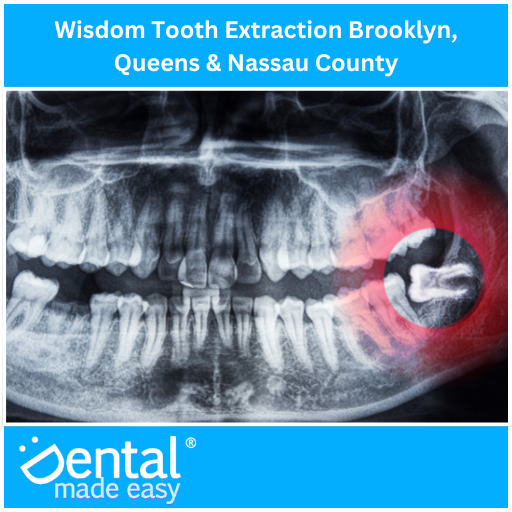Wisdom teeth, also known as third molars, are the last set of teeth to emerge in the back of the mouth. While they served an important purpose for our ancestors, wisdom teeth often cause problems for many people today. If you are looking for a leading dental clinic that provides wisdom tooth extraction in Brooklyn, Queens or Nassau County look no further than Dental Made Easy!
We have locations in Little Caribbean, Astoria, Forest Hills and New Hyde Park.
Understanding Wisdom Teeth and Why They Need to Be Removed
Understanding the role and common issues associated with wisdom teeth can help individuals make informed decisions about their dental health.
Wisdom teeth typically appear in late adolescence or early adulthood, between the ages of 17 and 25. Their function was to help our ancestors chew tough, fibrous foods. However, as human diets have evolved, wisdom teeth are often unnecessary and can lead to a variety of problems. There are two main causes for these problems:
- Impaction: One of the most common issues with wisdom teeth is impaction, where there is not enough room in the mouth for them to fully emerge.
- Erupted Wisdom Tooth: This is when the wisdom tooth has either fully or partially broke through the gum line.
Impacted wisdom teeth can cause pain, swelling, and even infection. They may also push against the adjacent teeth, leading to crowding and alignment issues. In these cases, wisdom teeth removal is often recommended to prevent further complication
When a wisdom tooth is partially erupted (where only a portion of the tooth breaks through the gum line) it leaves an opening for bacteria to enter. This increases the risk of gum disease and infection around the wisdom tooth. Fully erupted wisdom teeth can also be prone to decay and cavities if they are difficult to clean properly.
Regular check-ups and monitoring of wisdom teeth development can help identify issues early and ensure timely treatment, if necessary.
Signs You May Need Wisdom Tooth Extraction
While some people may not experience any issues with their wisdom teeth, others may require extraction due to various problems. Here are some signs that you may need wisdom tooth extraction:

- Crowding: When wisdom teeth try to emerge in a mouth that is already full of teeth, they can push against the other teeth, causing crowding and alignment issues.
- Pain and Swelling: Wisdom teeth that are only partially erupted or impacted can cause persistent pain and swelling in the gum area around the tooth.
- Difficulty Cleaning: The location of wisdom teeth, often at the very back of the mouth, can make them difficult to clean effectively. This increases the risk of tooth decay and gum disease.
- Cyst Formation: In some cases, the sac surrounding an impacted wisdom tooth can fill with fluid, forming a cyst that can damage the nearby bone and teeth.
If you experience any of these symptoms, it’s important to consult with your dentist to determine if wisdom tooth extraction is necessary. Early treatment can help prevent more serious complications.
Wisdom Tooth Removal Procedure: What to Expect
This is what to expect before, during and after a wisdom tooth extraction:
- Consultation: Wisdom teeth extraction typically begins with a consultation. We will examine your mouth, take X-rays, and determine the best course of action for removing your wisdom teeth. This may involve a simple extraction or a more complex surgical procedure, depending on the position and condition of your wisdom teeth.
- Extraction: On the day of the procedure, you’ll be given a local anesthetic to numb the area around your wisdom teeth. In some cases, you may also receive a sedative to help you relax during the surgery. We will then carefully remove the wisdom teeth, which may involve cutting away gum tissue or breaking the teeth into smaller pieces for easier extraction.
- Recovery: After the surgery, you can expect some swelling and discomfort in the affected area. We will provide you with specific instructions for managing pain and promoting healing, which may include taking over-the-counter pain medication, applying ice packs, and following a soft food diet for a few days. The recovery process can vary, but most people are able to return to their normal activities within a week or two.
It’s important to follow the recommendations that we layout for you and attend any follow-up appointments to ensure a smooth and successful recovery.
Don’t Delay Wisdom Tooth Extraction – Schedule Your Consultation
Many people will need to undergo a wisdom tooth extraction at some point in their lives. While it can be easy to put off this procedure, it’s important not to delay seeking treatment. Delaying wisdom tooth extraction can lead to serious oral health problems down the line.
If you’re experiencing any issues with your wisdom teeth, it’s crucial to schedule a consultation as soon as possible. We will evaluate the state of your wisdom teeth and determine if extraction is necessary. Don’t let fear or uncertainty about wisdom tooth extraction keep you from prioritizing your oral health.
Our team of experienced oral surgeons at Dental Made Easy are here to guide you through the process and ensure your comfort every step of the way. Schedule your consultation today to take control of your dental wellbeing.
Wisdom Teeth FAQs
How long does it take to recover from wisdom tooth extraction?
Recovery time from wisdom tooth extraction varies depending on factors such as the complexity of the extraction, the number of teeth removed, and the individual’s overall health. Full recovery and healing of the gums and bone can take several months, but most people can resume normal activities within a week or two. Always follow your dentist’s specific aftercare instructions to ensure a smooth recovery.
Is wisdom tooth extraction painful?
Wisdom tooth extraction is generally not painful during the procedure itself because it is performed under local anesthesia, sedation, or general anesthesia, which numbs the area or makes the patient unconscious. However, some discomfort and pain are common after the anesthesia wears off.
Do and don’ts after wisdom teeth removal?
After wisdom teeth removal, following proper aftercare instructions is crucial to ensure a smooth recovery and avoid complications. Here are some do’s and don’ts:
Do’s:
- Rest: Get plenty of rest and avoid strenuous activities for at least a couple of days.
- Apply Ice: Use ice packs on your cheeks for 20 minutes on and 20 minutes off to reduce swelling during the first 24-48 hours.
- Take Prescribed Medications: Follow your dentist’s instructions regarding painkillers and antibiotics.
- Eat Soft Foods: Stick to a soft food diet (e.g., yogurt, applesauce, mashed potatoes, smoothies) for the first few days.
- Hydrate: Drink plenty of water to stay hydrated, but avoid using straws.
- Keep Your Head Elevated: Use pillows to keep your head propped up while sleeping to minimize swelling.
- Gently Rinse Your Mouth: After the first 24 hours, rinse your mouth gently with warm salt water to help keep the area clean. Do this several times a day, especially after meals.
- Follow Oral Hygiene: Brush your teeth gently, avoiding the extraction sites.
Don’ts:
- Don’t Smoke or Use Tobacco: Avoid smoking and using tobacco products for at least 72 hours, as they can impede healing and increase the risk of complications like dry socket.
- Avoid Alcohol: Do not consume alcoholic beverages, especially while taking pain medications and antibiotics.
- Don’t Use Straws: Sucking actions can dislodge the blood clot, leading to dry socket.
- Don’t Spit Forcefully: Avoid spitting forcefully, as this can also dislodge the blood clot.
- Avoid Hot Foods and Drinks: Hot foods and beverages can increase swelling and cause discomfort.
- Don’t Eat Hard, Crunchy, or Sticky Foods: These can irritate or get stuck in the extraction site.
- Avoid Excessive Rinsing: Rinsing too vigorously can disturb the healing process.







